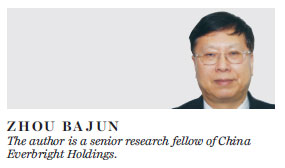National economy is vital to Hong Kong's prosperity
Updated: 2016-04-07 08:44
By Zhou Bajun(HK Edition)
|
|||||||
Li Ka-shing, the richest man in Hong Kong, said at a press conference on March 17 that he had not seen the city's economy struggle so much since 1996. A week later, on March 31, figures released by the SAR government showed a steep drop of 20.6 percent in retail sales in February from the previous month - the biggest month-on-month fall since January 1999. Indeed, not only have mainly tourism-driven retailers been suffering in recent months, but suppliers who cater mostly to local residents' demands have also found their sales values plummeting by 4.2 percent in February after surging 13.6 percent in January. Local supermarkets saw their sales values slide by 7.3 percent, on average.
Hong Kong's economy is now hit by both internal and external negative factors. The external impact comes in the form of the worsening global economy, which is doing so poorly that Janet Yellen, chairwoman of the US Federal Reserve, said in New York on March 29 the Fed was right to raise interest rates last December. But the changing global economy and financial markets could force the Fed to slow the pace of interest rate rises. Although she did not mention negative interest again, Yellen did not rule out the possibility of going back to near-zero interest rates and re-employing quantitative easing, either.
The worsening global economy has definitely hurt Hong Kong's external trade. Figures released by the Census and Statistics Department on March 29 showed Hong Kong's export value recorded the largest decrease since last September, as export volume dropped for nine months in a row. With global trade expected to keep falling in the rest of this year, Hong Kong's external trade will definitely suffer.
The internal conditions of Hong Kong's economy have obviously deteriorated as well. Its real estate market has been on a downward slide since October last year, while its stock market has basically remained bearish for months despite moderate rebounds in February and March. The poor showing of the property and securities markets inevitably left Hong Kong residents pessimistic about the outlook for the economy - so much so that their appetite for holiday shopping around Chinese New Year also took a hit, as food retailers and supermarkets generally recorded lackluster sales in February despite it being the most important holiday of the year.
Statistics alone are not enough to assess the economic condition, which is also determined by the local community's ability to withstand the negative impact of a poor economy. For example, the US financial meltdown of 2008 triggered a worldwide recession the following year and Hong Kong's economy took a severe beating like all other free economies did. Statistics of that time indicated Hong Kong's economic slowdown in 2009 was not as bad as during the Asian financial storm of the late 1990s. But people felt that the impact of the latest global recession was worse than 10 years earlier, because the local economic restructuring was stuck while the income gap widened.
Today, Hong Kong's economy is doing better than most other free market economies of the world as far as statistics are concerned. However, the political condition of the SAR has gone from bad to worse in the last few years while its economic transformation has hardly advanced. It is little wonder many Hong Kong people have no confidence in the local economy. It is fair to say Hong Kong is facing the most challenging economic situation for 20 years.
At a time when Hong Kong needs unity more than ever to fight economic adversity, some opposition groups are further dividing society by advocating "self-determination" and even "Hong Kong independence". They are betting on the ignorance of some local residents to gain popular support, but the great majority of Hong Kong people know very well neither "self-determination" nor "independence" is possible, and that the city's fate is firmly tied to the nation's.
Hong Kong's stock market has maintained its leading position in the world in terms of initial public offerings in the first quarter of this year, even though it was bearish most of the time. This is due to 19 mainland enterprises which went public here. Neither New York nor London was able to attract so many IPOs in the same period. The retail sector, on the other hand, could have suffered less in recent years had the "localist" radical groups not mounted waves of harassment against visitors from the mainland. Evidently, "localism" is merely an excuse for those organizations to advance their separatist agenda, which has done nothing but harm to Hong Kong society and will ruin everything if not stopped in time.
The mainland's economy, though under increasing pressure to slow down, remains the best-performing major economic powerhouse in the world today. It continues to drive the global economic recovery as much as it can. It is Hong Kong's only hope of sustaining moderate growth in the years to come, provided the SAR controls separatist groups.

(HK Edition 04/07/2016 page10)